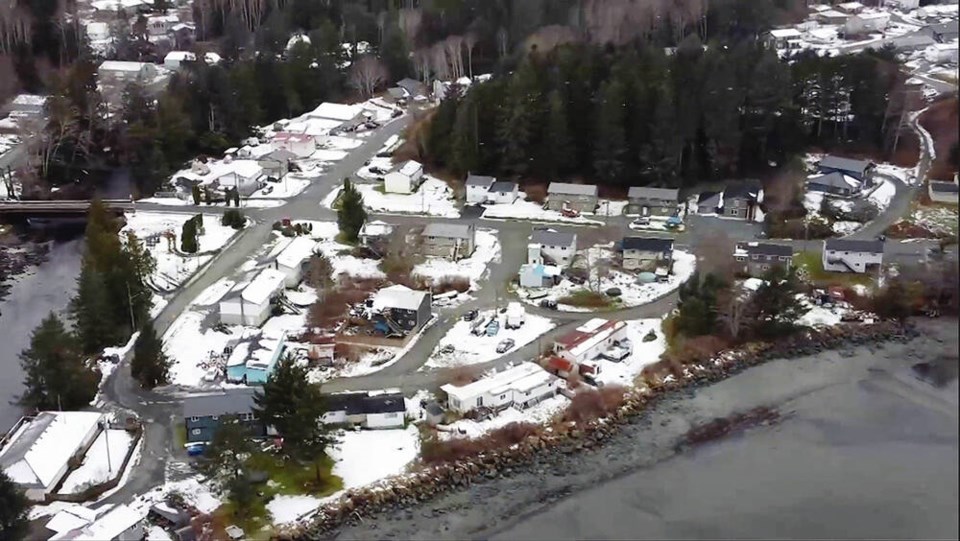The Gwa’sala-‘Nakwaxda’xw Nations have declared a state of emergency for their reserve north of Port Hardy following the deaths of 11 of its members in the past two months. Many of those deaths were caused by poisoned drugs and alcohol, the nation said.
Issued on the direction of hereditary chiefs and matriarchs, Gwa’sala-‘Nakwaxda’xw Nations council said it will take “all necessary measures” to protect its members and to remove drug dealers and alcohol suppliers from Tsulquate 4 reserve. “The loss of so many precious lives in such a short time have caused massive suffering, grief and trauma.”
Colleen Hemphill, chief treaty negotiator for the Gwa’sala-‘Nakwaxda’xw for 27 years, said six deaths happened within a span of 10 days. “As you can imagine, it’s pretty devastating.”
The Gwa’sala-‘Nakwaxda’xw Nations have an estimated 1,090 members.
It is custom for up to 200 people to gather for comfort services where they can bring food and grieve with the affected family after a person’s passing, Hemphill said. “People do their best to respond and try to help each other.”
But that’s been happening far too often, she said.
The Gwa’sala-‘Nakwaxda’xw Nations called on the RCMP to commit to enforcing the community’s bylaws to help protect youth from drugs and alcohol. Many of those who died were in their 20s.
“In recent years there has been a dramatic and disturbing increase in people supplying drugs and alcohol to GNN youth and members,” it said. “The RCMP have been reluctant to work with GNN in enforcing GNN bylaws and council resolutions to restrict or remove drug deals to try and prevent dealers from bringing deadly drugs into the community.”
RCMP Cpl. Alex Bérubé said that additional resources are being deployed, including officers from B.C. Highway Patrol and the Indigenous Police Service.
“The RCMP recognizes the profound impact that the loss of so many people can have. As we work and live in the area, we also have also been deeply affected,” he said in a statement.
Bérubé said the RCMP will continue to work with communities to “determine the role” of RCMP in enforcing bylaws and band council resolutions but did not respond when asked to clarify whether RCMP currently enforce Gwas’sala-‘Nakwaxda bylaws.
Maxwa Paddy Walkus, a hereditary chief and elected councillor, said that police are refusing to enforce a bylaw that aims to ban drug dealers from Tsulquate. “Three or four are still on reserve and still pushing drugs on young people. We’d like to have some mechanism, some resource to try and combat that.”
The community had previously spent two to three decades successfully reducing alcoholism in the community but drug use and substance-related deaths has been on the rise, he said. “Drugs — it’s taken more of our people than alcohol.”
Hemphill was in Ottawa this past week with a Gwa’sala-‘Nakwaxda’xw delegation and said she spoke to Crown-Indigenous Relations Minister Gary Anandasangaree and his staff about the crisis in Tsulquate. “They listened very, very carefully to what we had to say and they seemed committed to help.”
But she said it was eye-opening that some in the department had not heard of past federal decisions that have contributed to the underlying factors. “The federal government has a fiduciary responsibility to these nations [after they] placed us on these tiny little reserves, forcefully relocated us out of our territories.”
The Gwa’sala and the ‘Nakwaxda’xw were once separate Kwakwa̱ka̱ʼwakw nations on the central coast, but were forcibly amalgmated and relocated to a reserve north of Port Hardy in 1964, ostensibly for improved housing, health and education.
When they arrived in Tsulquate Reserve, only three houses without running water and sewage service had been built, but the government had already burned down the two communities they left to prevent them from returning, as detailed in the 1996 Royal Commission on Aboriginal People.
“Deaths happened immediately,” said Hemphill, who is of the ‘Nakwaxda’xw. “People were stuck [living] on boats that sometimes sunk and drowned young children in the river.”
“It’s been a struggle this last 50-plus years since,” she said.
School programs on the reserve were cancelled or cut short several times in February for funerals.
The nation’s health and family services have started weekly workshops to help deal with grief and loss.
The Gwa’sala-‘Nakwaxda’xw council cited the impacts of forced relocation, residential schools, and the impacts of “systemic removal of children and breaking up of families by the provincial government” as factors that have increased the community’s vulnerability to toxic substances.
Hemphill said that Gwas’sala-‘Nakwaxda elders and leaders have been working with what resources they have to help their youth and community.
Health directors from the Gwa’sala ‘Nakwaxda’xw, and nearby Kwakiutl and Quatsino First Nations issued a joint statement on Friday asking for Island Health to fund on-call community outreach workers in each community for the next 30 days to address the unfolding mental health crisis within their communities.
The three North Island nations have requested a tri-nation coordinator role to oversee the crisis response and provide preventative programs for community members.
An Island Health spokesperson she was unable to respond to a request for comment on Saturday but that Island Health may have more information by Monday.
Walkus said that having dedicated on-call support is critical, as well as more supports for those wanting to get out of addiction.
His daughter, who struggled with alcohol use, had recently wanted to go to a dry-out centre but was told the wait was between six weeks and six months, he said.
She was among the recent deaths in Tsulquate. “I’ve been in a dark place since,” Walkus said. “There’s no words to describe that emotion.”
>>> To comment on this article, write a letter to the editor: [email protected]



